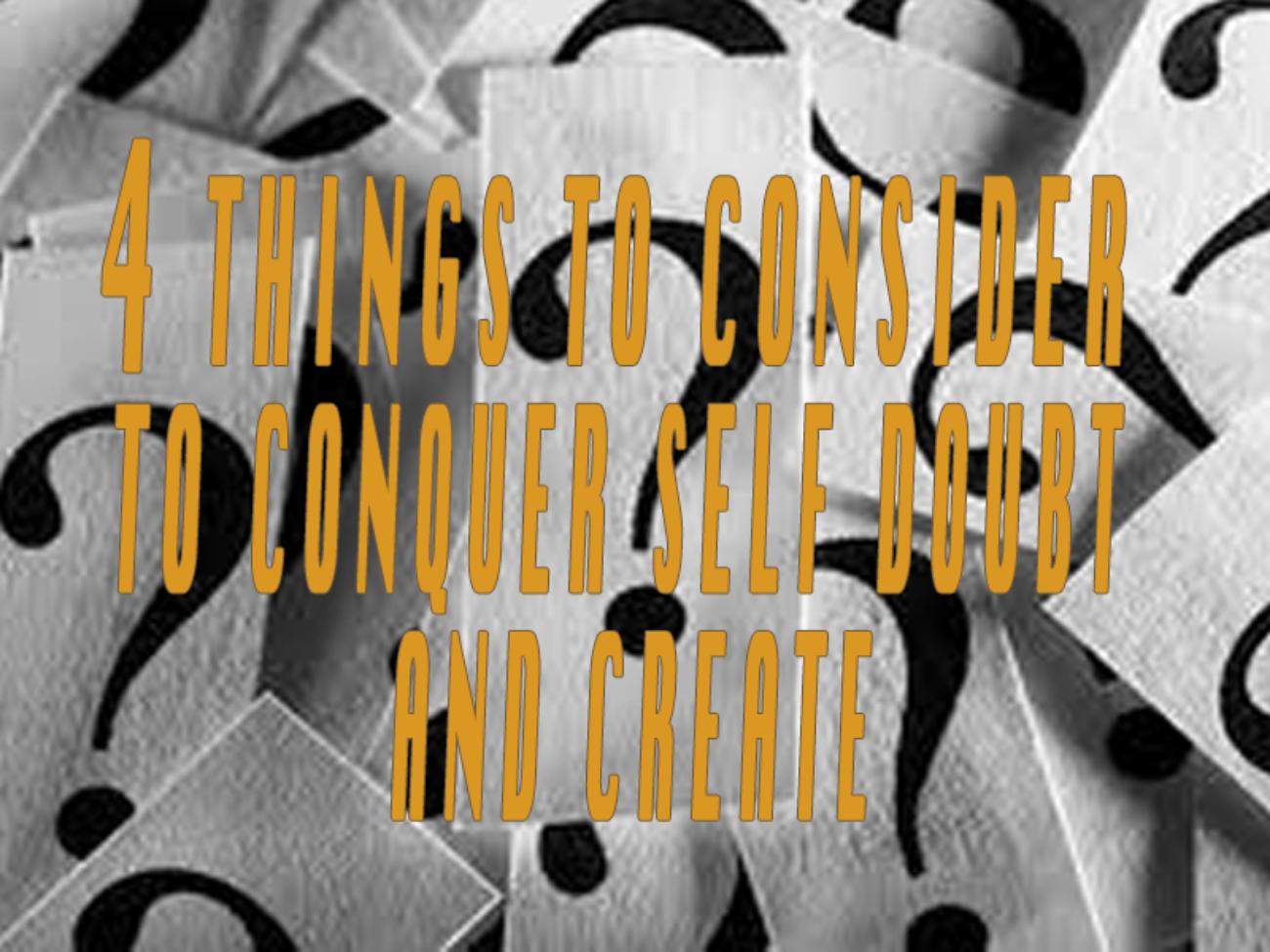Achickwitbeatz presents the Instrumental Intel podcast, bringing you information instrumental to your artistic career including music industry news & tips, insights & interviews, and beats for your inspiration. Listen on Saturdays at 7 pm EST on Grander Radio and Achickwitbeatz.com.
Follow on Facebook, Instagram, Twitter, YouTube Audiomack & SoundCloud, and subscribe on your favorite podcast platform. Download the Grander Media app to listen to Grander Radio on the go.
- Art
- Independent Labels
- Internet Radio
- Music Documentaries
- Album Reviews
- Music History
- Music Industry News
- Free Game Friday
- Free Downloads
- Poetry
- Books
- Interviews
- Did You See It?!
- Hip Hop History
- Hear Here
- Music News
- Hip Hop Documentaries
- Music Marvels Radio Show
- Think Piece Thursday
- Mini Documentaries
- Instrumental Intel
- Music Humor
- Indie Analysis
- Conversations & Quotables
- Music
- Resources for Artists
- Podcasts
- Beats/Instrumentals
- Music Education
00:01
Hey, thank you for tuning in to instrumental Intel. I am your host, music producer, Achickwitbeatz, and I'm glad that you're here with me. Today's episode has music industry news, beats by me for your inspiration, and later I'll be joined by my special guest, Reggie Braxton. We're gonna talk a little bit about unlocking musical possibilities through persistence and so much more. So I'm excited to be bringing this episode to you. And before I go ahead and drop that first beat, I gotta give a shout out to my home station, Grander Radio out of Grand Rapids, Michigan. And with that,
00:31
Let's go!
[BEAT BREAK]
14:11
Alright, I'm back with the music biz brief. First up, global music revenues are projected to almost double, reaching 200 billion by 2035, according to Goldman Sachs' latest Music in the Air report. Growth slowed to 6.2% last year after a strong 2023, but analysts expect recovery with revenues up 7.7% in 2025.
14:32
Streaming growth is leveling off in developed markets, but emerging regions are still a major opportunity, already accounting for 60% of new subscribers. The report also highlights live music's resilience, higher ticket prices, and new revenue streams like superfans and video content as key drivers for the future. It's also worth noting that Goldman Sachs predicts streaming price increases every 12 to 24 months.
14:56
Bandcamp has launched Bandcamp Clubs, a new subscription model that blends old-school record clubs with modern community spaces. Each club is led by a curator, like DJs, journalists, and collectors, who hand-pick a digital album each month for members to own permanently. Alongside the music, subscribers get interviews, updates, and access to live listening sessions where fans can connect and discuss the records. With genres ranging from heavy music to global dance sounds,
15:23
FanCamp Clubs put human curation and artist support at the center of music discovery. Also, Listening Party, the startup for hosting virtual album premieres, has relaunched its app with a major upgrade. Fans can now join the same event from different streaming platforms, including Spotify, Apple Music, and SoundCloud. Previously limited to single-service parties, this update makes it easier for artists to bring their whole audience together for launches, back catalogs, celebrations, or special anniversaries.
15:52
For more information and to request the quote, please make sure you check out their website. Next, vinyl, CDs, and cassettes remain exempt from new U.S. tariffs, but Bandcamp and Discog's warrant artists expect possible delays and mistakes as customs adjust to the rules. While informational media like Music is Protected, merch items such as shirts and tote bags are still subject to import taxes.
16:15
Bandcamp advises artists selling internationally to update shipping costs and consider deliver duty paid options to avoid unexpected charges or refuse deliveries. Also, the European Commission has paused its investigation into Universal Music Group's $775 million acquisition of Downtown Music Holdings while it waits for requested information. The deal announced last December has raised concerns that Universal could reduce competition by gaining access to rival labels' data.
16:44
The inquiry's original November deadline has already been extended and a new timeline will be set once the review resumes. Industry groups and independent labels remain divided on the deal's potential impact. Next, Spotify says its ticketing partnerships have grown rapidly, now working with more than 35 providers worldwide. In the past year, 228,000 artists had shows listed on the platform, leading to 74,000 selling tickets through Spotify.
17:12
The company is integrating events into artist pages, feeds, and recommendations with a focus on helping mid-tier and emerging artists fill venues. Spotify is sticking to primary ticketing partners, avoiding resale markets, and, hence, expanding Beyond Concerts into comedy and live podcasts in the future. In other news, the Nordic Collecting Society's Cota, Teosto, and Tonal are shutting down their joint licensing venture, Polaris Hub, at the end of the year.
17:38
Formed in 2019 to negotiate deals with platforms like Spotify, YouTube, and TikTok, the hub is being phased out as the CMOs say today's music market demands greater scale and international reach. Each society will now pursue licensing agreements independently while assuring rights holders that royalty distributions will continue without disruption during the transition. Next, Warner Music Group is restructuring its UK operations to work more closely with its US labels.
18:07
Atlantic and Warner Records UK leaders will now join their US counterparts global leadership teams aligning A &R and marketing to help artists scale internationally. Warner says the move is designed to give British acts more global reach while also boosting US artists in the UK. This news follows the announcement that the Warner Music UK CEO Tony Harlow will step down in October. And finally, AI startup Anthropic has raised $13 billion in a new funding round.
18:35
valuing the company at $183 billion, making it larger than Spotify and more than triple the valuation of Universal Music Group. Founded in 2021, the company says annualized revenue jumped from $1 billion to over $5 billion this year, with 300,000 business customers now on board. This influx comes despite the ongoing copyright lawsuits from music publishers and others. Perhaps it's to fund potential settlements, so we'll have to wait and see how that plays out.
19:05
All right, that's it for the music biz brief. I'm going to take a quick pause for the cause and I'll be back with my special guest, Reggie Braxton, right after this. Keep it locked.
[BEAT BREAK]
28:27
Hey, I'm Achickwitbeatz, multi-genre music producer and strategist to indie artists and labels. Visit achickwitbeatz.com for resources for artists and instrumentals in various genres available for songs, vlogs, blogs, podcasts, themes, TV, film, commercials, and more. Once again, that's achickwitbeatz.com. That's A-C-H-I-C-K-W-I-T-B-E-A-T-Z.com. Let's make something happen.
28:57
Thank you so much for tuning in to instrumental Intel. I am your host, music producer, Achickwitbeatz. And I'm excited to say that I have in the virtual building with me today, Reggie Braxton, who is a multi-hyphenate talent. And so yeah, before I go ahead and turn it, well, I guess before I say, you know, go ahead and let the people know who you are. I just want to thank you for taking time out of your schedule. Um, I can see how busy that you've been. So I'm glad that you've come on the show to share.
29:25
But yeah, if you could just kind of introduce yourself to the world, let them know who you are and how you got involved with music. Yeah, my name is Reggie Braxton and I'm gonna love her music all my life. And that's been a great journey. And I start off, I actually got kind of a late start. I didn't take music lessons as a child. I was a basketball player. And so when I got a chance to
29:54
was old enough to buy my own piano was when I actually got started. So I liked to practice. And so I liked skills. So when I got my first apartment, just, the neighbors would be banging on. I was like crazy man. So I let them know I didn't like that. But I would just love skills. And so that led to me meeting people.
30:21
A lot of seasoned musicians who was a blessing. These guys are really great musicians. It's ironic. Some of the people that I had a chance to mentor me, people that I had to play with, John Coltrane, really crazy Aretha Franklin. These people were really giants in the community that some type of way I was able to connect with them. So, kind of gave me a fast track.
30:51
on picking up the music, you know, because I had some really giants in the music, just really genius type guys and who encouraged me to continue this journey with the music. So a lot of late nights practicing until you're ready to go on stage. So. OK. Thank you. So you mentioned some of your mentors.
31:16
What would you say would be maybe some of the most valuable lessons that you've learned when working with them? Well, oh it's always practice, you know, it's always practice is always getting repetition, know, oh listening to listen to the greats, you know, and they're the great teachers because they've already done it.
31:43
So if you listen and understand, you know, if you're looking at, say for example, first person comes to mind, it's like Luther for example. He was to me the ultimate, ultimate singer. And so, you you listen to him a few thousand times and you're doing your thing. so you, I think you learn certain techniques, uh certain things they're doing ah that can help you be who you are, you know?
32:13
So, and that's kind of basically what this piano, everything is practice. It really is no magic blinding thing. It's like you learn certain techniques or whatever, and then you practice, you know? And you know, you work on your side. I remember when I first started recording myself, I hated to hear my voice. You know, I said, man, know, people said, why didn't you sound good? said, nah.
32:40
I couldn't even listen to it, you know. Then I started to really like what I was hearing. After many years, I started to say, well, this sounds pretty good, you know, something like that. And then be able to relax and, you know, being able to really relax and get into what you're doing and feel confident. But that comes from practice, you know. It's just no way around getting good at something.
33:07
that she put the work in at RepSense. Anybody that knows me, I'm always saying, well, you know, you got to put the work in. And I think that's, you know, that's the key. And then, of course, you know, God given talents too, that helps too, but you don't acknowledge that yourself. You more, for me anyway, it's, you just keep working at it until you, you know, until you get something that you like. Okay. I see that that's a recurring theme about practice and
33:36
How do I want to say this? I guess in the present era and age, we got a lot of people that kind of want to take the shortcuts, especially now, you you start seeing more more people saying, well, no, now with AI, I could do this or that. So I'm not knocking that. But I think what you're saying is just so important as far as, you know, actually honing your craft instead of just trying to get the shortcut way. Yeah. Yeah.
34:04
And you know, it comes from the love. So the practice is, you know, you down here doing my next thing I know it's three in the morning, you know, and I may be working on the same thing over and over again, you know, and come back the next day. Feels a little better, you know, and but it's I think it's the love, you know, that you have for something that actually allows you to pursue greatness, you know.
34:33
And we've already had a lot of great work in the past. So you ain't got to really, you can go back as far as you want to go back with this thing. You're going to find some people long gone, but still, they had put that work in their craft and you can learn a lot from them. And it's a lot of great young talent too. I I use the thing is, I love jazz, I love some hip hop people.
35:04
you know, in all the genres, there's somebody that I get in my playlist that I really like, you know? So, no boundaries, it's just you listen. Hear it, you know you like it. What I love about Shazam, I hear something, I Shazam. Hold it one second, let me Shazam. So my playlist, sometimes I'll be someplace and I'll put it on and someone say, what do know about that?
35:33
I said, I just heard it. I don't even know the song. I heard a few bars. Boom, I liked it. Yeah. So that's the exciting thing about this week. I'm recording is that, man, I can do all of this stuff. know? Yeah. But you know, it takes, it takes some, it's just, I don't know, just other than say it's a blessing because to be able to get into space where you're able to record.
36:01
and do things and take it to the next level. So it's all about the people you're able to meet. And I think that comes from the pursuit. And when you're ready, know, things seem to appear like that, you know? Yeah. I'm sorry, ahead. Oh, no, you're all right. But, know, a lot of people that listen to the show tend to be in the creative fields and whatnot. So, you know, since you mentioned
36:29
You're always practicing, staying on top of your game, and then to be ready when you meet people. What kind of advice do you have for any artists that might be kind of struggling with that aspect of it? So like maybe, you know, they've got all this stuff kind of tucked away to the side, but now it's time to actually get out there and connect with people. How have you handled that with your career and what advice do you have for somebody that might be looking for something like that? Well, you know, I think, what do you say, Achickwitbeatz, is that your name? Yes.
36:59
Chick? That's CWB. You know, I think that in anything, you have to be able to step outside your comfort zone, you know, and a lot of really the great artists, a lot of times, you know, they may not be the most outward, you know, sometimes the people who don't really have a lot of talent, they're...
37:26
They're the most bolstrous and all you gotta do is look at karaoke. And people just jump up and I'm just like, man, I don't even know how you can have enough nerve. And then the people who can really sing, those ones in the back, sometimes they don't have a thing. So my thing is, you have to be courageous too and make yourself do things. Make yourself introduce yourself. Hey, know this is what I'm doing.
37:54
you know, I'd like you to check what I'm doing out. And there's little things like that and the spirit of music and having a good spirit, but also being able to understand the importance of stepping out of your comfort zone, if that makes sense. So that would be my thing there, you know, is to have confidence and then, you know, you have to be able to, I'll never forget, was this, was...
38:22
I was one of my first gigs and it was a elite uh jazz club, right? You had some of top musicians. so my friends who were all these guys end up being great musicians and they had already been performing at a younger age. I got started late and so I was singing what was called a Teddy Harris New Breed Bebop Society band, super musicians.
38:53
and a of these guys are world-class and doing great things. Now, the plan will get, you know, some of greats that we know today. And I remember going up and I would be scared to death and I want to be back in the, with the musicians in the back. I said, bros, get up front, get up front. So I would just make myself do it. And so I would go up and, and it was crazy. was making $125 for the whole band.
39:22
That's crazy. And some weeks I would go up and the owner Richard, he would say, Reg, you know, we're trying to get next week. So just having the courage to go up and then go through it and the mistakes or to get to comfort, know, comfort zone or get comfortable with what you're doing. You know, I think understanding that if you can, somebody could tell you that, hey, you don't have to
39:51
Go through that. I think that's helpful to know that nobody starts off great, you know what saying? They have talent, but they still have to go through certain things. So I would say, know, be comfortable to go outside your conference hall, introduce yourself to people, uh go where like-minded people like, where people are like you, and they're gonna understand when you tell them something, they're gonna understand exactly.
40:18
where you're at and then they're going to encourage you. And that's kind of what I think would be a good thing. I don't know if that makes sense. Yeah, perfect sense. Great advice. know, definitely a gem to kind of keep in mind. I've been producing for about 17 years now, I think it is. And if you would have told me that I'd be hosting a podcast and sometimes on camera and having to listen to my own voice back then, I definitely wouldn't have believed it.
40:48
Cause I hated all that stuff. you know, actually that's really my favorite thing about being a producer is because I get to be in the background and I don't have to be in the front. So I feel like everything that you said, um, you know, just kind of spoke to at least what's kind of helped me to get out of my shell a little bit. So I know that it'll help anybody who's listening right now that might be struggling with that too. But yeah. Um, like you said, you know, connecting with like people.
41:17
It's definitely helpful and really important to do. So I kind of want to backtrack a little bit. had mentioned, you know, listening to some of the greats and you mentioned Luther. Who are some of your other early influences, you know, that kind of shaped who you are now? Well, my family, you know, like my grandmother was a singer. So really we go all the way back. She would be at, had a little organ and she would, uh
41:46
She had some gospel stuff she was saying. And then she was a blues singer, right? And she used to travel and stuff like that. She used to tell me those stories. I didn't know, but she would show me some pictures. She was beautiful pictures, you know, with the musicians in the back. And then her song, when I always remember, she's just saying, Sensor, I Fell For You.
42:12
And uh she was a big hot Billie Holiday fan. so I was around listening to that as I could remember. uh Diana Ross, uh know, uh Sarah Vaughan, all these old school that were great, great singers and stuff when I get old enough to understand, I say, wow, you know.
42:42
Brooke, Ben, these are just all really great, great singers. So my grandmother had a big influence and then my cousin, who was a member of the Temptations. And so that was like huge at the time because they were big and they would come over, had their little durags and everything. then next thing you know, they would be on these shows. And man, I was just blown away. We had a chance to go and...
43:10
and watch them and it was just mine. I man, this is what I wanna do. So that really, that really, really said, man, I really wanna sing. And so I would always be trying to sing, sing these songs and things like that. And so, you know, the groups, you know, there a lot of groups there, you know, and so.
43:37
At the talent shows we would have, you know, they would always have the guys with the tenors, the ladies would go nuts when they'd do that. They'd say, man, that's not my voice. And so anyway, I remember my cousin, Melvin Franklin is his name. And he did a song called, I'm sending you red roses and violets.
44:06
Violets are blue. So it was a nice melodic baritone bass. He was really a bass. so he kind of opened me up that every, no matter what your note is, if it's quality, it all works out. So that let me know. said, okay. And I just keep doing my thing. And I will always hear.
44:32
I even heard this as crazy like, you're like a black Frank Sinatra or something. I was like, I was like offended. But come to find out it was really a compliment in some of the things that they were saying, you know. And I always had no matter what I did, I had kind of a jazzy feel even way back. so that was my initial influences, you know, some of the groups, dramatics, and I really liked the romantic type songs.
45:02
uh the whispers and then but a lot of my favorites were female you know uh i loved that ross you know the old school um uh sarah vine i just thought they had amazing even if you go back and listen to them now i mean those voices were just like they were angels you know and so that same thing all the way up i i this is kind of fast forward but i i want to see um
45:32
Chris Brown, right? And so uh he had uh SZA, not SZA, uh Summer Walker. uh And so I thought about Nancy Wilson, I thought she's more than a right? And so you got all the big sound, she not screaming, she just a stylist. And I said, you know, that's kinda what Jhene Ako, uh you got Jhene Ako, you got SZA.
46:01
You got Summer Walker, you got some of these other chicks that's, I love them, you know, and they not screaming, but sweet, you know, and they singing these melodies and they sling, you know, and they got some little slick stuff happening. I listened to a lot of that too, but it's music, it's all relatable, you know, because you you had the Patti LaBelle's and the Aretha's, but you know, but you also had Nancy Wilson, you know, you had.
46:31
Her voice is like velvet. Velvet, you know what saying? Dionne Warke, would personally, Dionne Warwick, loved Dionne Warwick, you know, and then I heard Luther say, you know, she was the one that I would listen to and I would still hear what he saying, even from a male perspective, some of her nuances of some of the things that she was doing vocally, you can apply that in your own register.
46:58
You know, I understood what he was saying. So anyway, I go and just next time he's gonna take me, I'll be way over here. How did I get over here? Yes, you've gained some incredible talent, so I mean, yeah. Yeah, incredible. It just doesn't end. And it's hard to, you know, I don't want to be put in a box because
47:23
my musical experience and even with the stuff that I'm doing, if you listen to my uh whole album, got, we did a Drake tone, ah you know, I did an Anthony Hamilton, I did a Frank Sinatra, I did my own stuff, you know, so it kind of represents, you only get put so much on one project, so, but my thing goes, it's like I got so much music inside me, and now,
47:53
uh I had wrote her some tracks, but I'm just paying to song that I'm playing. I wrote it totally with just piano. And I think it's gonna be a good tune. I'm about ready to put that down. So it's just, I tell you, it's just amazing to know that now I'm able to put stuff out that the world, that was my whole dream.
48:22
that I wanna be able to have music that people can enjoy like I did. I can remember situations, being a young man and coming up in music. Sometimes I feel like he would say in my life, in terms of, it's crazy, but music has always been a super influence for me, some type of way. And I would tell any woman, even my wife, say, hey, now this is not a hobby, just, got, but because I got a...
48:50
how they say, the bag, you know what I'm saying? But don't get it twisted. This is what you see here. This is what I do for real. So, uh a lot of times, and I'm kind of digressing, but it's as a musician and you trying to learn them notes like you got, it's a lot of work in and it's a lonely in terms of you gotta be by yourself when you work on your game.
49:20
Yeah. And so it's blessing to have someone that understands and let you, you know, do what you need to do. And so you understand that. Absolutely. Absolutely. My husband has been very understanding and supportive. But yeah, you definitely need your partner to kind of be on board with it because it does take a lot out of you. so, you know, speaking of kind of getting into music, you're
49:47
about ready to lay down the new track that you're ready to share with the world. What do you typically do to kind of get to the point where like, okay, you know, I compose this music, now I've written this song. Like, do you have like a ritual to kind of get into the creative space or is it just part of the process? You know, it's, I can't even, I thought, I think about that, but it's different all the time. You know I'm saying? It's like, I'm moody. So it kind of.
50:15
It's uh a mood thing I can sit down here and I can hear something and oh it's there. Sometimes you can't force it. It's just sometimes it just be a day that man, this is it. And sometimes you sit down and oh create the creativity, something really special, something hits you like, oh man, this is my jam. This is a jam, it's gonna be a jam.
50:44
You know what I'm saying? So it just changes all the time. You know what it inspires me? know, I'll hear a song and that I like a lot and that make me go and I like this African beach life. Like, what's this guy, Essence, they did that Wiz kid and that man, I that tone. said,
51:09
Geek speak when I heard that. I just like that groove and then you get inspired by hearing certain things, know, know, certain things that you hear then you can, because nothing is new, new, because you only get, you only get here. Right. So that's the beauty of it. And then you can find your own creativity within that. Yeah.
51:38
And so what I do is now you have to have a good producer, you know what I'm saying? To really bring a song to life. You know, you can have, I can play these chords and do my thing, but then when you get a producer, they're add the strings or make that beat down. You can have an idea. So that producer is very, very important to get you to a level
52:07
Whereas, you know, it's a lot of competition. So you gotta have top-notch people and it's a blessing to get to a point where people wanna work with you. uh So uh it's exciting, I admit. Yeah, it's okay. As far as working with people, oh how do you kind of figure out who to collaborate with? uh Well, oh right now, this is like my first project.
52:38
in terms of on this level, right? And so uh I think things is, don't know, music is spiritual too. I think that you put stuff out there and you draw things to you. And so this is like, I have some great things that happening now. Uh I had did a remake of Next Lifetime by Eric Badoo. And I did it from a male perspective. And so, you know,
53:08
It did well, was like the number one most requested over in the UK, you know, and things like that. And so I wanted it to be on my album, but they wouldn't let me put it on my album. I had a Georgie portrait, so them two, everybody else, no problem. But then I said, let's go back again. People, my connection, let's ask them again, hey, you know, I really wanna try this, okay, let us look at what you're doing. You know, so we wanna make sure.
53:37
This is on a quality project. So we sent them everything. They asked us to send me, send my whole album to them. They said, okay, we're gonna let you do it. But we want to remix this tune. We're gonna re-engineer this tune. The guy's name is Norman, uh Mr. Keyes Hurt. So of course I Googled, this guy's a Grammy award-winning uh guy, uh engineer, music director for Eric Abadu.
54:07
I say, now, okay, this is to me, this is saying something. So when you say, well, so that just kind of organically happened, which I think is a big thing that this guy, you– Absolutely. Then when I heard it back, even though I thought the mix was fine, it took it to another level. And we send the stuff out to some panels and things like that. uh
54:37
They just organically, a stations started, you know, so they're to start playing it. So to get back to what you're saying, you know, you just keep working at it. And then if it's good enough and you put yourself, you put in the front enough people, then you know, you, you know, I think it attracts, you know, that's something I can say. I don't have a whole lot of experience at this point. I mean, obviously when these great things continue to happen.
55:05
you know, some of these people I would love to do things with, you know, because I noticed once you get a hit, the, the, the, how can I say it, the proverbial, the, the elusive hit, you get that hit and, you know, these scars from the nineties and whatever they get that one, they may be living off of one or two hits. They still getting all over the world for that one hit. So I said, well, you know, hopefully, you know, I'm in pursuit of getting
55:35
that one hit that's played on all the radio stations, everywhere you go, you hear Reggie Braxton doing his Braxton thing, you know? So anyway, I don't know if that made sense with that. No, absolutely it does. You you've shared so much information and wisdom that I think is helpful to anybody making their way in the creative path. So I'm looking at the time and
56:04
Man, it went by so quickly. I want to make sure that everybody knows what you've got coming up uh in the pipeline and also where they can find you, follow you, stream you, all that good stuff. Yeah, well, I'm excited. So what's happening now is we're re-releasing the Braxton Experience. And so I did add, and you're the first person to know that nobody else knows, is I added a song by John Legend.
56:32
And it's called Take Me Away. So this song here always ended up even always, always, sometimes it's a song that wasn't the most popular, but it was a song that I really liked a lot. So, and I like a story. And so are you familiar with Take Me Away? Yeah. Yeah. Yeah. so I just finished that.
56:59
And any song that you hear that I do, people listen all the way through. I done did something to it. Whether it's the ending, like for example, Best of Me. I took that bridge and I added lyrics to it. But anyway, the Braxton Experience, I'm re-releasing that. And it's gonna be on all digital platforms. It's gonna be 16 songs.
57:30
I wrote some of the songs, I wrote about, I don't know, three or four of songs. And then with my partner, we wrote a few songs together as well. Jay Powell, he wrote the Something's Going On. Yeah, so he's been really helpful in terms of, I've known him a long time, but exposing me to getting my thing off.
57:59
You know what saying? So it's the Braxhall experience. You know, I have several videos. You can go to YouTube. I would say please go in and check my videos out. And on YouTube, please subscribe, leave some comments and tell other people about it. We really, really appreciate you going and even buying the download the music, you know, I spent a lot of money on it's been 15 hours for something I like.
58:29
It's just nothing, but that's how I feel about music. So I would ask and hope that people at least check it out and see what I'm doing. All right. Socials? Are you active on social media? Yes. It's Reggie Braxton, 007 on Instagram. And then on Facebook, I have two. One is Reggie Braxton Music and then just Reggie Braxton.
58:56
You know, it's a few Reggie Braxton, so they have to look like me. I'm like, cool this guy on there. Cool as Reggie Braxton. And so anyway, uh you're easy to talk to. So this is, this is really, really good. I appreciate a blessing of getting a chance to talk with you. made me relax. Talk to me. So glad to hear it. Well, you know, since it went by so quickly, hopefully this would be part one of
59:26
Many more to come and you can come back again. I'd to. All right. Awesome. Thank you so much. Okay. Thank you. All right. And that's a wrap for this episode of instrumental Intel. I've been your host, music producer Achickwitbeatz. And once again, I want to thank you for tuning in. I want to thank my special guest, Reggie Braxton, for coming through and sharing his story, wisdom and knowledge. And I'd also like to thank my home station, Grander Radio out of Grand Rapids, Michigan. Make sure you come back next week. I got more goodness lined up for you. So.
59:55
Until next time, you know where to find me. Tune in, tell a friend, and I'll see you then. Peace.
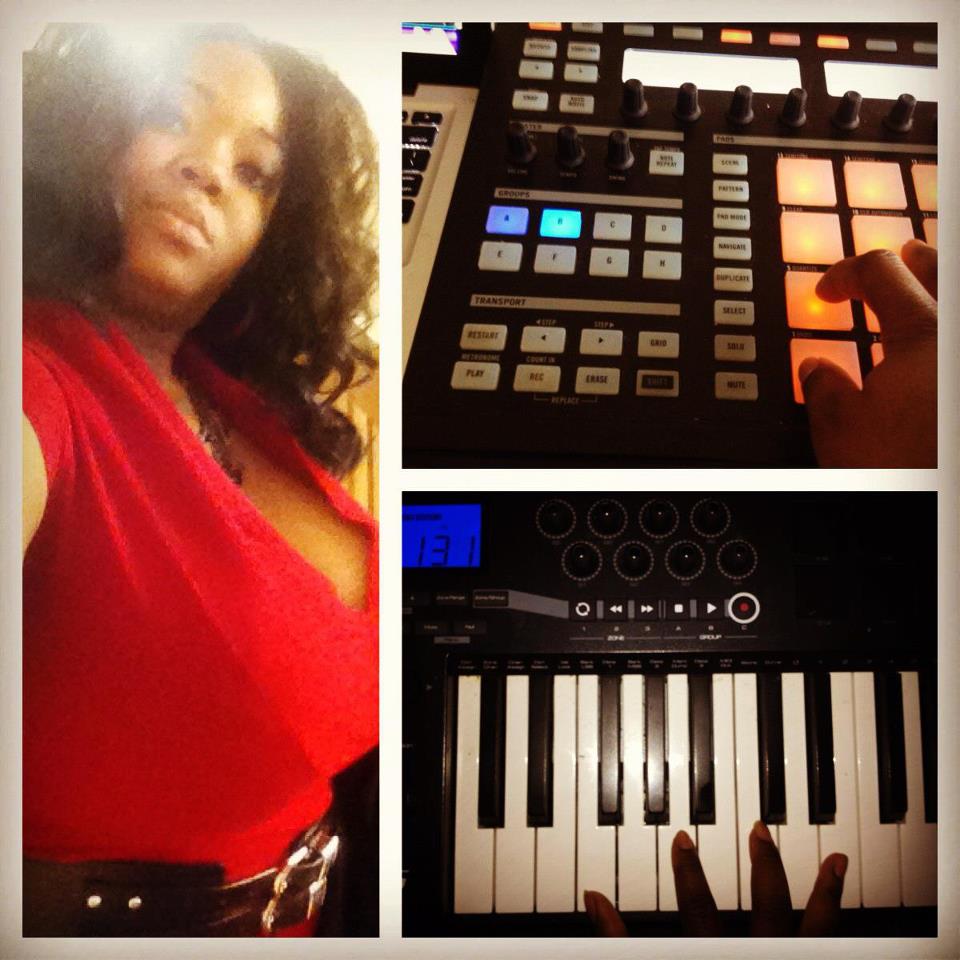
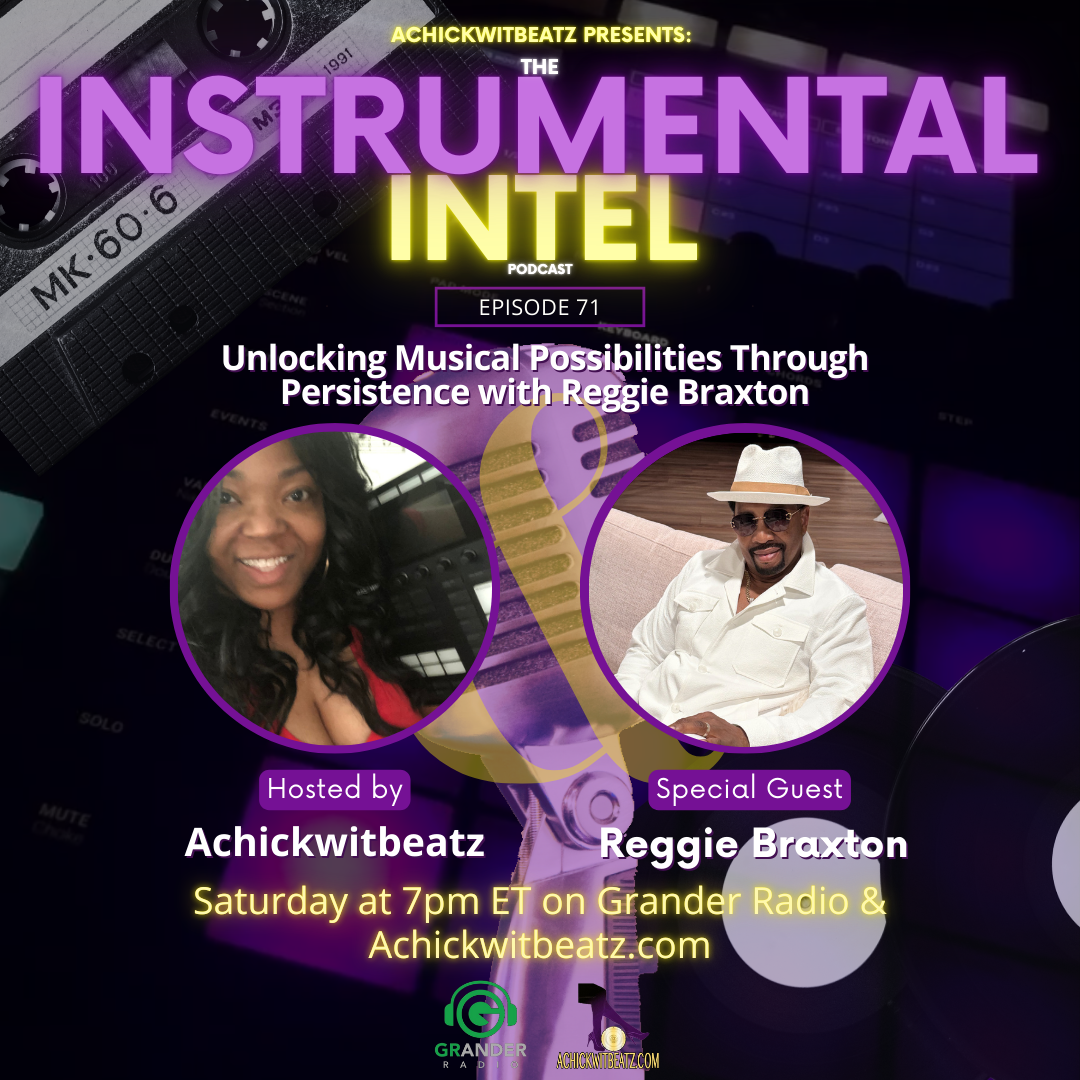






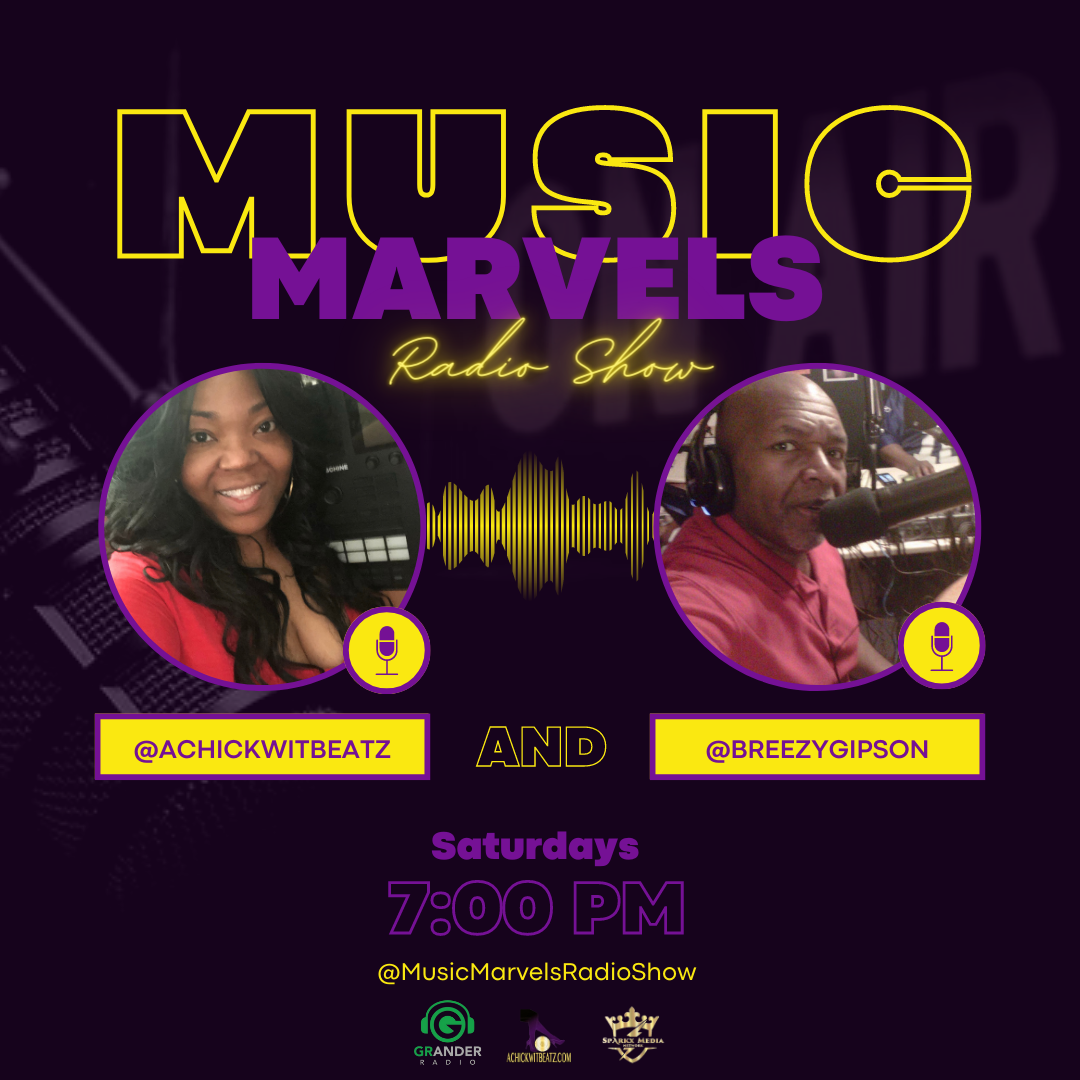
![Hear Here: Achickwitbeatz - Dopamine & Serotonin [Single]](https://images.squarespace-cdn.com/content/v1/52b0b90ae4b0293bfed0d692/1710852808557-EZYGFDIBHLBSIRFOVS1Q/Dopamine+%26+Serotonin.JPG)


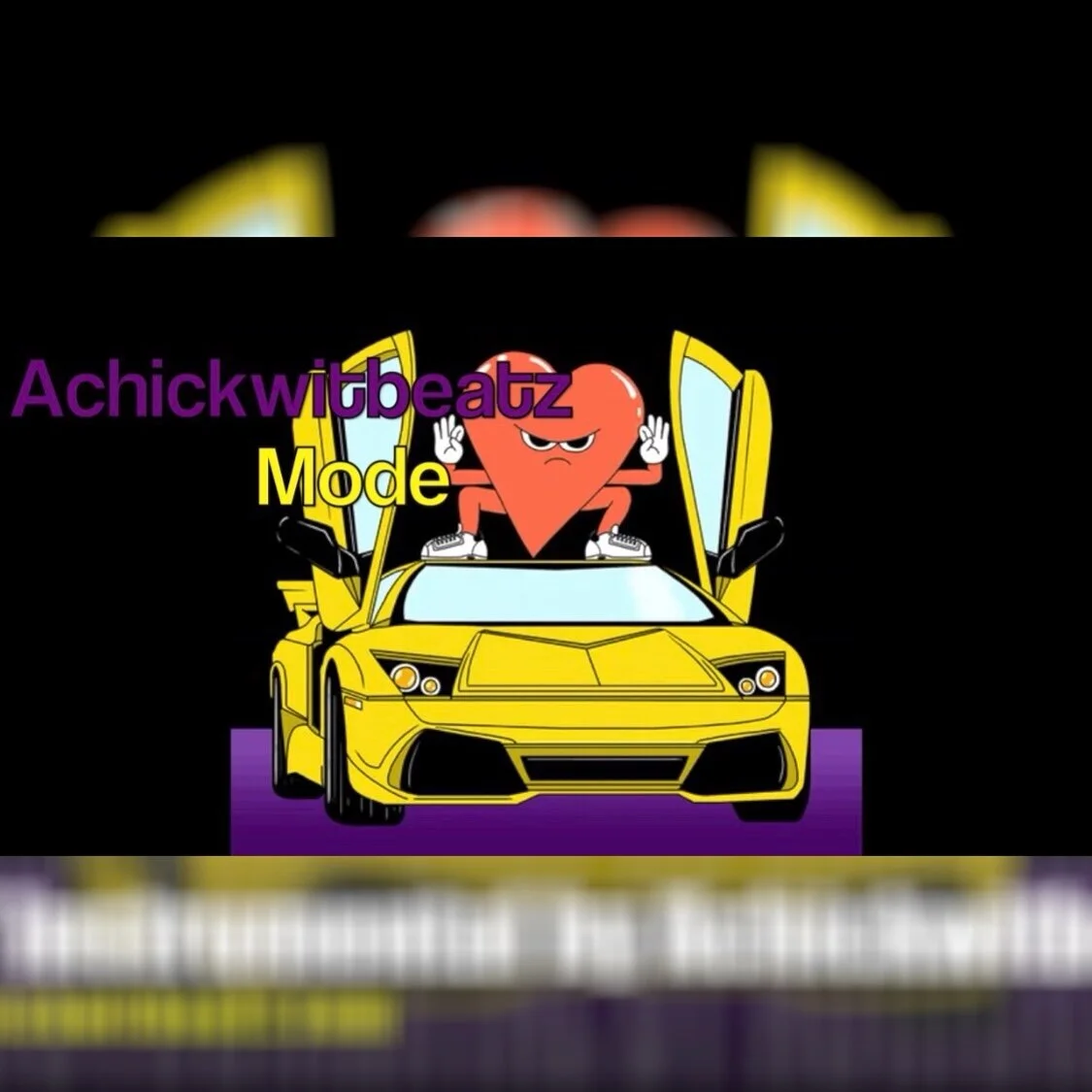
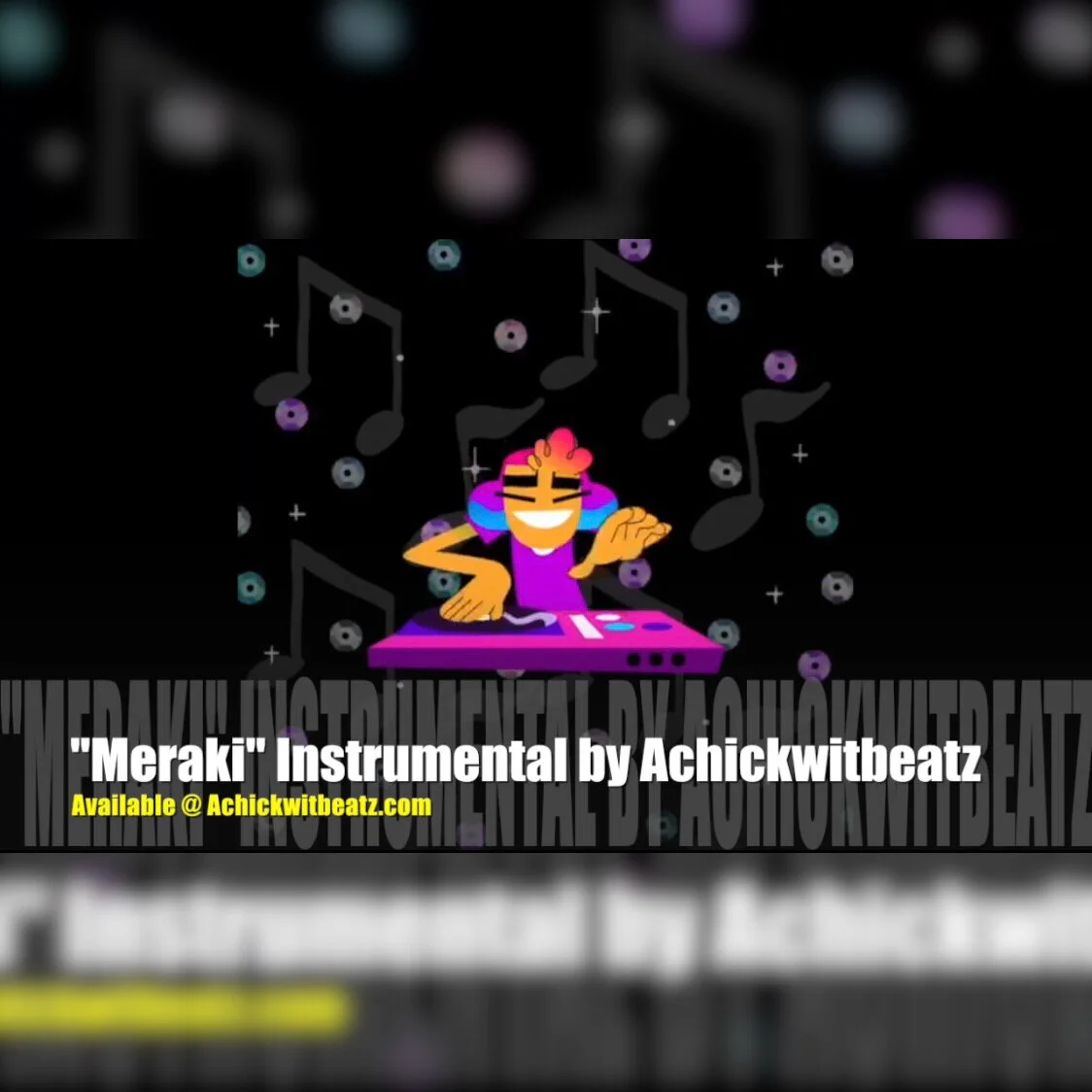





![Hear Here: Dagga Man- "Analytics" [Prod. by Achickwitbeatz]](https://images.squarespace-cdn.com/content/v1/52b0b90ae4b0293bfed0d692/1584638158548-9R55AZLWZIDFJC8LATV6/IMG_2212.JPG)







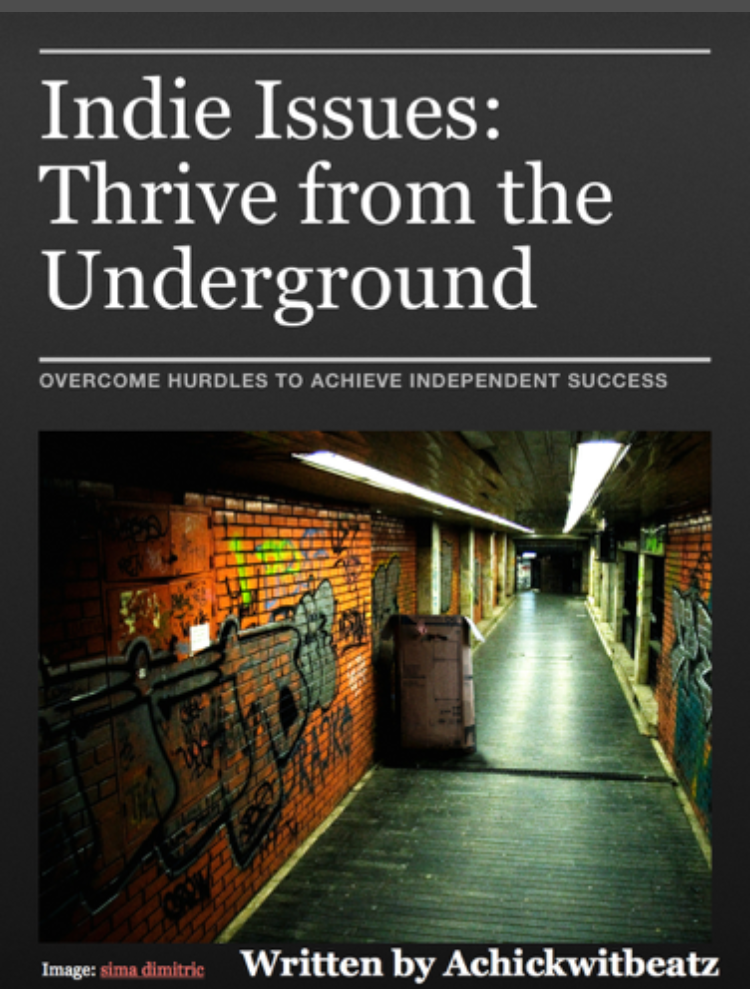
















![Making Music on a Budget [Infographic]](https://images.squarespace-cdn.com/content/v1/52b0b90ae4b0293bfed0d692/1582844361438-3JTE5NT3EL51FHXC0WJI/making-music-on_1929722%25281%2529.jpg)
